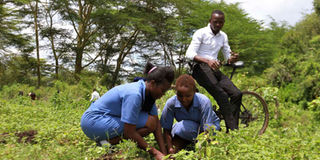Joint bid to bring Kiu Springs back to life

Students of Kenya Medical Training College, Makindu, plant seedlings at Kiu Springs in Makueni County. PHOTO | FILE | NATION MEDIA GROUP
Kimeu Mulwe paces across his maize field at Mavavaini Village near Makindu river in Makueni County scouting the crop for pests, occasionally lost in thought.
Until three years ago when the river completely dried up, the farmer used water from the river to irrigate acres of egg plants, kale, tomatoes and okra throughout the year in the same spot where he is growing maize. “Traders who export fresh produce used to come for the it at the farms using refrigerated trucks. There were times I pocketed Sh800,000 in three months from growing and selling tomatoes. I used to earn Sh180,000 per month on average," says the 56-year-old who now has to contend with little produce.
The problem started with the over abstraction of water at Kiu springs, the source of River Makindu. This led to the drying up. This is despite the fact that Kibwezi-Makindu Water and Sanitation Company had set up a pumping station right at the springs to supply water to residents in Makindu, Kiunduani and Kibwezi towns and the surroundings.
Massive deforestation of Chyulu Hills National Park, which recharges the springs, heightened the water crisis, according to Kenya Water Towers Agency.
Kibwezi, Thange and Mtito Andei rivers which also depended on Chyulu recorded dwindling volumes of water, prompting concerted efforts to conserve the park.
The park has since been recovering after it was fenced off by David Sheldrick Wildlife Trust. As a result, Kiboko and Mzima springs which emanate from the park are being restored. "To respond to the drying river, we would sink shallow wells along the river so that we could continue watering our crops during the dry spell," said Mr Mulwe. The wells ran dry six years later and a serious conflict over the resource set in.
In 2015, at the height of the conflict over water, Makindu chief Jackson Kimende blacklisted irrigation along River Makindu saying the water levels were abnormally low.
This forced Mr Mulwe and hundreds of other farmers in the region to reluctantly fold up their enterprises.
But, now residents have taken responsibility of restoring the river. The community, conservationists and government officials recently descended on Kiu springs armed with hoes and seedlings and planted more than 5,000 seedlings in a conservation drive aimed at restoring the springs and saving River Makindu.
Ms Jennifer Kianga, a community leader who launched the reforestation, called on residents to protect the seedlings from being eaten by livestock.



